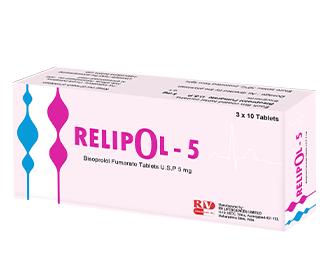
RELIPOL 5mg Tablet
Therapeutic Class
Cardio Selective Beta 1 Blocker
Indications
Bisoprolol fumarate tablets USP are indicated in the management of hypertension. It may be used alone or in combination with other antihypertensive agents. Treatment of stable chronic heart failure with reduced systolic left ventricular function in addition to ACE inhibitors, and diuretics, and optionally cardiac glycosides.
Chemical Composition
Each film coated tablet contains Bisoprolol Fumerate USP 5mg
Packaging
3 x 10's per box
Dosage & Administration
As directed by Physicians. For management of heart failure, starting from 1.25mg, not to exceed 10mg per day. For management of hypertension, starting from 2.5mg, if necessary up to 20mg per day.
Contraindications
Bisoprolol is contra-indicated in patients with: - hypersensitivity to the active substance or to any of the excipients of the formulation. - acute heart failure or during episodes of heart failure decompensation requiring i.v. inotropic therapy - cardiogenic shock - Second or third degree AV block (without a pacemaker) - sick sinus syndrome - sinoatrial block - symptomatic bradycardia - symptomatic hypotension - severe bronchial asthma or severe chronic obstructive pulmonary disease - severe forms of peripheral arterial occlusive disease or severe forms of Raynaud's syndrome - untreated phaeochromocytoma. metabolic acidosis
Side Effects
Bisoprolol is contra-indicated in patients with: - hypersensitivity to the active substance or to any of the excipients of the formulation. - acute heart failure or during episodes of heart failure decompensation requiring i.v. inotropic therapy - cardiogenic shock - Second or third degree AV block (without a pacemaker) - sick sinus syndrome - sinoatrial block - symptomatic bradycardia - symptomatic hypotension - severe bronchial asthma or severe chronic obstructive pulmonary disease - severe forms of peripheral arterial occlusive disease or severe forms of Raynaud's syndrome - untreated phaeochromocytoma. metabolic acidosis+G6+H6
Drug Interaction
Combinations not recommended Class- antiarrhythmic drugs (e.g. quinidine, disopyramide, lidocaine, phenytoin, flecainide, propafenone): effect on atrio-ventricular conduction time may be potentiated and negative inotropic effect increased. Calcium antagonists of the verapamil type and to a lesser extent of the diltiazem type: negative effect on contractility and atrio-ventricular conduction. Intravenous administration of verapamil in patients on beta-blocker treatment may lead to profound hypotension and atrio-ventricular block. Centrally-acting antihypertensive drugs (e.g. clonidine, methyldopa, moxonidine, rilmenidine): concomitant use of centrally-acting antihypertensive drugs may further decrease the central sympathetic tonus and may thus lead to reduction of heart rate and cardiac output and to vasodilatation. Abrupt withdrawal, particularly if prior to beta-blocker discontinuation, may increase the risk of "rebound hypertension". Combinations to be used with caution Calcium antagonists of the dihydropyridine type such as felodipine and amlodipine: Concomitant use may increase the risk of hypotension, and an increase in the risk of a further deterioration of the ventricular pump function in patients with heart failure cannot be excluded. Class-Ill antiarrhythmic medicinal product (e.g. amiodarone): Effect on atrio-ventricular conduction time may be potentiated. Parasympathomimetic medicinal products: Concomitant use may increase atrio-ventricular conduction time and the risk of bradycardia. Topical beta-blocking agents (e.g. eye drops for glaucoma treatment) may add to the systemic effects of bisoprolol. Insulin and oral antidiabetic medicinal products: Increase of blood sugar lowering effect. Blockade of beta-adrenoreceptors may mask symptoms of hypoglycaemia. Anaesthetic agents: Attenuation of the reflex tachycardia and increase of the risk of hypotension (for further information on general anaesthesia see also Special warning's and precaution for use). Digitalis glycosides: Increase of atrio-ventricular conduction time, reduction in heart rate. Non-steroidal anti-inflammatory medicinal products (NSAIDs): NSAIDs may reduce the hypotensive effect of bisoprolol. B-Sympathomimetic agents (e.g. isoprenaline, dobutamine): Combination with bisoprolol may reduce the effect of both agents. Sympathomimetics that activate both - and a-adrenoceptors (e.g. norepinephrine, epinephrine): Combination with bisoproll may unmask the a-adrenoceptor-mediated vasoconstrictor effects of these agents leading to blood pressure increase and exacerbated intermittent claudication. Such interactions are considered to be more likely with nonselective B-blockers. Concomitant use with antihypertensive agents as well as with other medicinal products with blood pressure lowering potential (e.g. tricyclic antidepressants, barbiturates, phenothiazines) may increase the risk of hypotension. Combinations to be considered Mefloquine: increased risk of bradycardia Monoamine oxidase inhibitors (except MAO-B inhibitors): Enhanced hypotensive effect of the beta-blocking agents but also risk for hypertensive crisis. Rifampicin: Slight reduction of the half-life of bisoprolol possible due to the induction of hepatic drug metabolising enzymes. Normally no dosage adjustment is necessary. Ergotamine derivatives: Exacerbation of peripheral circulatory disturbances.

